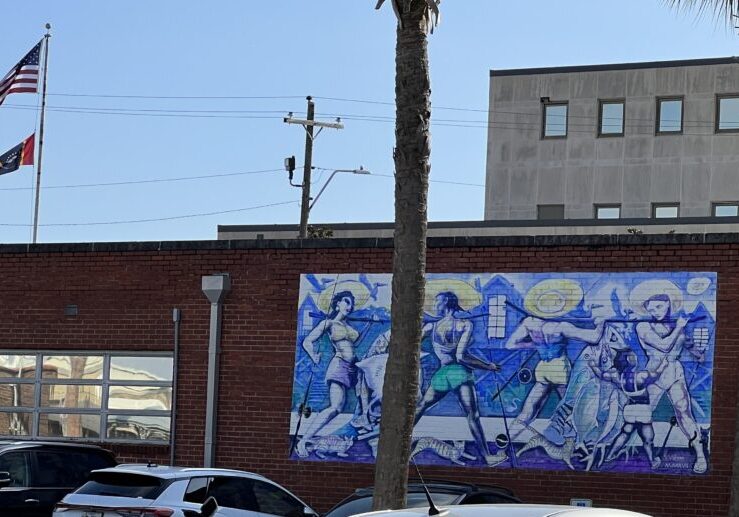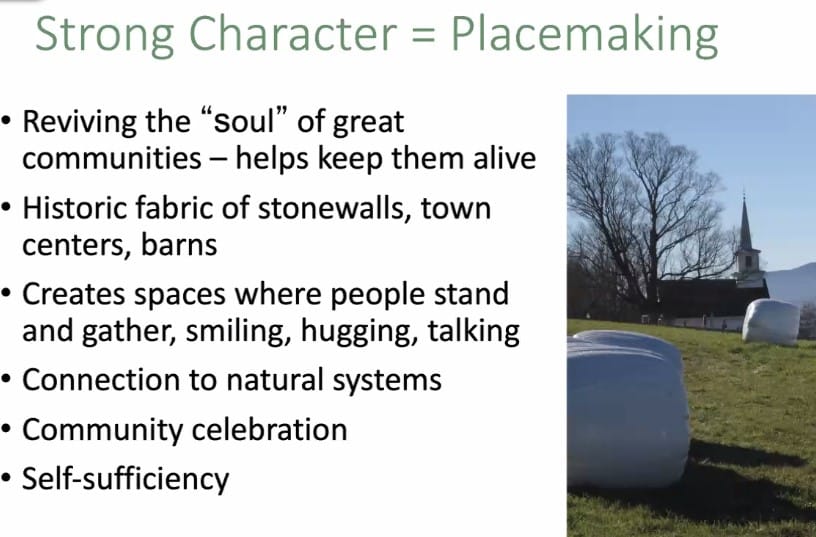
I attended Placemaking in Small and Rural Communities online conference hosted by USDA and the University of Kentucky. It was all day, and I was able to attend most of the sessions. Enjoy this article that shares the tidbits I gathered.
Why attend something like this?
I work in rural communities and placemaking is vital to their growth. I like to gather stories, links to important information, and ideas. Then I share them with you.
There was a place to ask questions, share links to articles and events and to view attendee ice breakers.
I asked How often are arts the subject of small-town events?
There were a few answers and I find it interesting the more Idea Friendly an event or activity is, the more action around it. Here’s a couple of answers:
- Our town, Cabot, VT, is about 1200 in population. We have a local arts association. Live music at least once/week somewhere in the village. There’s a pub with local craft beer in our hardware store that hosts music.Fiber arts show and tell once/month. Once/summer we host a broader outdoor arts festival. Apple Fest in the fall with craft kiosks. And then a 12th night festival in January. And more.Most of the towns, some under 1000, around us host at least one music festival in the summer. It’s a hopping place. People gather. They’ll pay up to $20 for professional musicians from away, but most events are by donation.Some mural painting in public spaces. Playground building. Lots of volunteer energy required.
- Our local events always include live music and crafters, but the food draws the attendees and the events are usually history focused. We would love to have a more art-focused event!
Another person asked about Volunteers.
Here are those answers:
- I worked for a small Indian Tribe in the 90’s and a friend of mine who had worked for Acorn would start knocking on doors in the community if people weren’t showing up for a community meeting they had said they would be at. Talk about grass roots organizing! She didn’t take no for an answer.
- Judy Larson in SD answered a question about volunteers. Judy is Idea Friendly! I love this topic and have spent years working on ways to recruit and retain volunteers, with some success (and some failures! But always lessons learned).
- Tiny tasks, fun opportunities to serve, dissolve standing committees and make ad hoc committees.
- Stop doing the things that people don’t want to volunteer for (sounds harsh, but it really helps us look at what matters to people).
- Trade volunteer time with other groups, i.e. work at a Lions club function to help them out and they return the favor by working your event. That way your volunteers aren’t overwhelmed if you are a small organization.
- Plan activities based on the assets around the table (asset based community development).
Childcare was discussed
This is one idea for finding help.
- There’s a Girl Scouts class (and probably a Scouts one too) on babysitting and EMT skills so they may be able to provide this and build those social-community connection.
Links Shared:
First Impressions via Extension office
https://economicdevelopment.extension.wisc.edu/first-impressions/
Innovation Matters: Funding Opportunities, Publications, Events and Learning
https://content.govdelivery.com/accounts/USDARD/bulletins/27e0a04
Mapping rural America’s diversity and demographic change
Example of a rural agrihood
https://www.urbanpeacegardens.org/
Rural Development session:
This was a panel discussion. Rural Partners Network was shared. This site is the front door to federal programs and information; a place where you can learn from others working to improve their rural communities. https://www.rural.gov/
400 offices across the US – they serve undeveloped or underdeveloped communities. https://www.rural.gov/community-networks
Rural by Choice session
Lynn Seeley presented. New Ruralism Initiative Case studies were shared and this link has more info:
https://nne.planning.org/knowledge/new-ruralism/
Their categories they emphasize are:
- Focusing on food
- People helping people
- Buildings jobs on our strengths
- Energy of Volunteers
- Other innovative rural initiatives
Marci Penner spoke about their work in Kansas with the Kansas Sampler Foundation. Marci is a rural hero of mine, and anytime I get the opportunity to listen to her, I do. Check out what they are doing in Kansas. Kansas Sampler Foundation | Pursuing Everyone’s Love for Kansas
We know to look for the long-term ripple effects. Small steps really do count and make a difference.

Jeff Siegler, keynote speaker.
- No one can fix your problems externally. The promise of a silver bullet is an empty promise. We have to do the work ourselves. Pride, self-esteem, a general feeling of well-being – put in the effort to grow those.
- We are proud of the things we have ownership over. If someone in your town goes big, you are proud.
- Beauty matters. Aesthetics matter. We pay more for it. It’s a demonstration of quality and craftsmanship.
- Walmart is not just one store, it’s 50 stores under one roof. That’s 50 families without a business.
- It’s an emotional issue, we have to heal emotionally.
Celebrate –
Your tradition, your history, what makes you special, your identity
Raise your standards –
- Don’t worry about the pushback. Deal with vacant and blighted property. Say ‘we noticed and showcase those properties. Don’t hide them.
- If you tell them how to build, they will still come. Don’t think that setting standards will stop developers and builders from coming.
Increase ownership and connection –
- If you call the city, someone should call you back. If you don’t get reciprocation, you stop caring.
- Create beautiful public spaces.
Connect – gather – meet people socially –
- Have block parties! Get out and do things. Go to lunch outside, play music in the park, get social.
Appearances –
- Do judge a book by its cover
- We navigate the world by making judgement
- People will judge your town by how it looks
- Improve things – even small things like planting flowers
Action –
Take action
- No one needs a committee to pick up trash
NEA grant program was shared on groups:
NEA Creative Placemaking Grant Program – FY24 Our Town. Description: Our Town Applications are Open! Deadline August 3 Guidelines and instructions for the Our Town grant program are now available online. (copy and paste into your browser: https://www.arts.gov/grants/our-town/program-description)
Through project-based funding, Our Town supports activities that integrate arts, culture, and design into local efforts that strengthen communities. These are cost share/matching grants ranging from $25,000 to $150,000, with funding starting July 1, 2024 for 1–2 year projects.
The application is submitted in two parts; the Part 1 deadline is August 3, 2024. Opportunities to connect with Our Town staff include a webinar on June 15 at 2:00 pm ET and three Q&A sessions on June 27, July 20, and August 10. Registration information is on the Our Town Applicant Resources page. (copy and paste into your browser: https://www.arts.gov/grants/our-town/applicant-resources)
Our Town supports projects that advance local economic, physical, or social outcomes contribute to long-term systems change within communities and bring new attention to or elevate key community assets and opportunities, local histories, and a community’s unique civic infrastructure.
We want to honor a wide range of traditions shaped by the lived experience of a community’s residents, including music, dance, design, crafts, fashion, cuisine, and oral expression. We have also updated the guidelines to make the partnership requirements more flexible, in order to encourage cross-sector work and engage with stakeholders from throughout the arts ecosystem..
